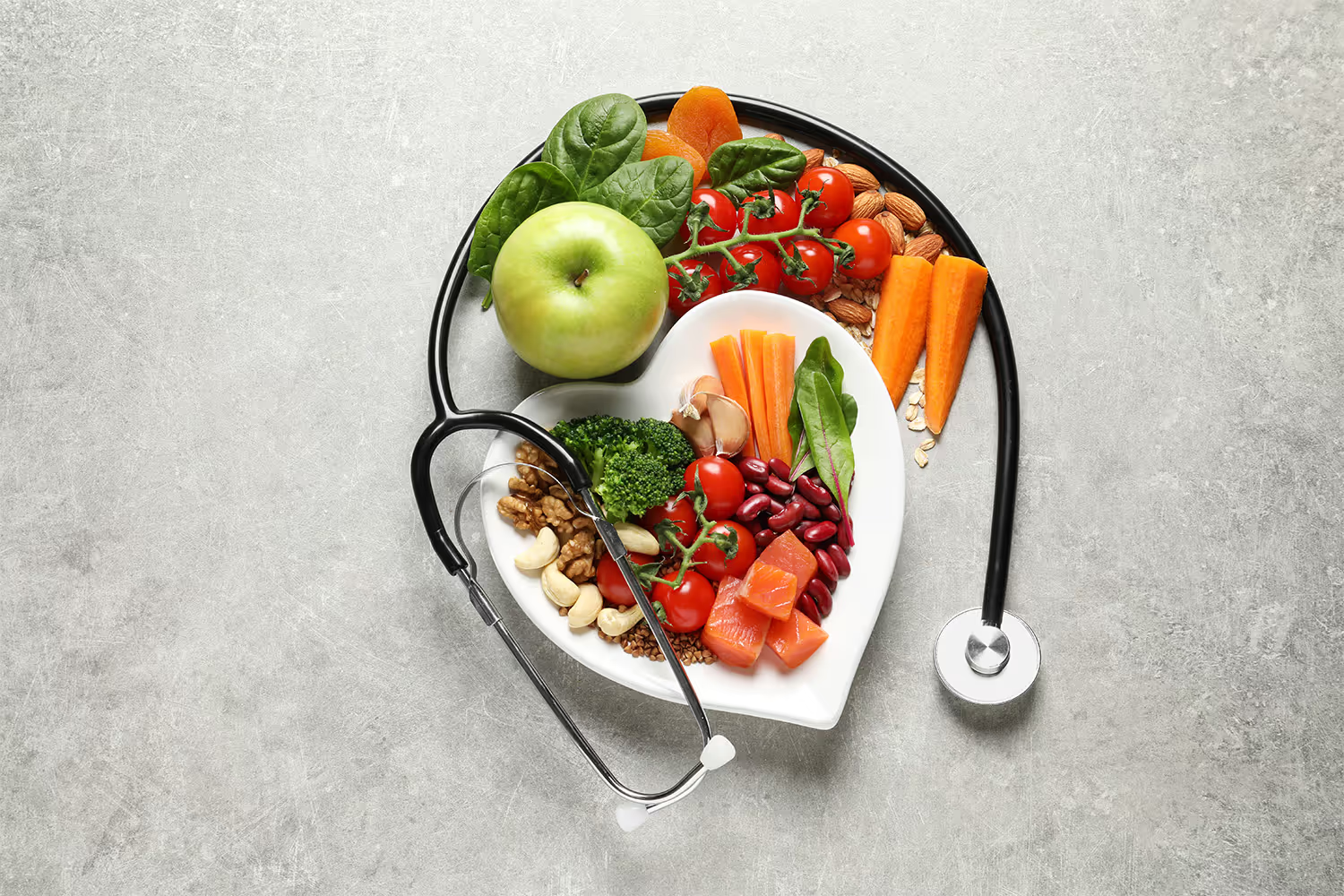
Heart health is important to maintain in order to live a happy and healthy life. The heart is responsible for pumping blood and delivering oxygen and nutrients to fuel each cell within the body.
Maintaining and improving heart health requires you to create heart-healthy habits. These habits range from improving cardiovascular fitness through exercise, to eliminating heart-damaging habits like smoking, to eating a heart-healthy diet.
Below is a closer look at the dietary choices you can implement to help improve your diet and make it heart-healthy.
What Foods Should You Include in a Heart-Healthy Diet?
A major contributor to a decline in heart health has to do with poor dietary habits that start with poor food choices. When poor food choices compound, it can lead to a number of issues, many of which can negatively impact the heart.
Below is a closer look at some specific dietary choices you can make to live a more heart-healthy life.
1. Omega-3-Rich Fish
Many people have a misconception that having high cholesterol means that you need to avoid fats at all costs. While reducing fats is important, there are a number of fats that can actually help bolster your heart health, including omega-3 fatty acids.
Omega-3 fatty acids play an important role in the body. Omega-3 fats can help reduce triglycerides, slow the growth of plaque, and support healthy blood pressure. In addition to its heart benefits, omega-3s have been shown to help support the brain.
Omega-3 can be supplemented, but it is also obtainable through your diet. Fatty fish such as mackerel, salmon, cod, herring, anchovies, and sardines are all excellent natural sources of omega-3.
2. Walnuts
Nuts are an excellent source of healthy fats, antioxidants, and proteins. In addition to their overall nutrition, they also may be able to bolster your heart health. Walnuts, in particular, have been shown to help reduce the risk of cardiovascular diseases.
Walnuts are high in omega-3 fats, which are known to help lower LDL levels and bolster healthy cholesterol levels within the blood.
3. Fat-Free, Low-Fat, or Greek Yogurt
Dairy is a great source of calcium and protein but can also be less than ideal for individuals dealing with chronically elevated cholesterol levels. A heart-healthy option is to adjust your dairy intake to include more low-fat or reduced-fat options.
Dairy products like skim milk, Greek yogurt, and cottage cheese are great alternatives that are more heart-healthy than their full-fat counterparts. You can also opt for dairy alternatives, which have a reduced amount of fat, making them ideal for reducing cholesterol levels.
4. Vegetables
A well-rounded diet is essential, and for heart health, it is important not to skimp out on your veggies.
Vegetables are an incredible source of natural fiber, vitamins, and minerals and are naturally low in trans fats and calories. Simply them to a side of a meal, enjoy them in a salad, or grill up some fresh veggies for a tasty meal.
While adding veggies is undoubtedly good for your health, it is important to take certain precautions if you are on blood-thinning medications such as warfarin.
In particular, be cautious of increasing your consumption of vegetables that are naturally high in vitamin K, such as spinach, kale, and broccoli, as excessive vitamin K can reduce the effectiveness of warfarin.
5. Beans
Beans and legumes are excellent protein sources and are full of other healthful nutrients like minerals, fiber, and vitamins.
Many sources of protein, like animal-derived protein, tend to contain saturated fats, which, if consumed in excess, can contribute to high cholesterol and, over time, be detrimental to heart health — but not beans and legumes.
Beans or lentils can easily be added to most meals and provide a healthy source of protein without increasing your cholesterol. The added fiber and protein to your meal can also help to keep you satiated and full to avoid overeating and weight gain. If you are considering adding beans or legumes to your diet, try to opt for low-sodium options.
6. Seeds
Seeds are an excellent addition to a heart-healthy diet as they contain a wealth of nutrients and compounds that support heart health. Seeds are rich in fiber, monounsaturated and polyunsaturated fats, plant-based protein, vitamins, and minerals.
These nutrients work together to help support lower LDL cholesterol levels and support optimal cardiovascular health. Seeds are also a great source of antioxidants, including vitamin E and selenium, which help protect the heart and may help reduce the risk of heart disease.
Some great heart-healthy seeds include chia seeds, hemp seeds, and flaxseed. Incorporating more seeds into your diet, whether as a snack, smoothie ingredient, or meal topping, can help make your diet more tailored to heart health.
7. Sweet Potatoes
If you were to ask most nutritionists, they would likely tell you to avoid french fries or loaded baked potatoes if you are trying to have a heart-healthy diet. With that said, not all potatoes need to be limited, and this is especially true for sweet potatoes.
Sweet potatoes are a good source of fiber, vitamin A, vitamin C, potassium, iron, and antioxidants. The high fiber content makes it excellent for facilitating satiety to keep you feeling fuller, and the fiber also helps to lower its glycemic index, which can be important for maintaining healthy blood sugar levels.
8. Oats
Breakfast can be a weak point in creating a heart-healthy diet since bacon, eggs, pancakes, and cereal are often people's go-to meals. While tasty, these foods are high in cholesterol, saturated fat, and sugar, which are not ideal for supporting the heart.
A tried and true breakfast for heart health is oats — more specifically, minimally processed oats free of sugar and other additives. Oats are an excellent heart-healthy breakfast option as they contain a high amount of fiber and are considered whole grains.
A specific type of fiber found within oats, known as beta-glucan, appears to reduce cardiovascular disease risk factors.
How Else Can I Maintain a Heart-Healthy Diet?
Providing specific foods you can eat to foster heart health is a good start, but ultimately, having a heart-healthy diet is more about how you approach the food you eat.
Below is a closer look at some general guidelines you can follow to ensure your nutrition and diet support your heart health.
Get Plenty of Fruits and Veggies
Plant-based diets have grown in popularity in recent years, and for good reason. Plant-based diets are not only healthy but also good for the environment and even your heart health.
People who follow a healthy plant-based diet tend to have lower rates of heart disease, high blood pressure, and high cholesterol compared to those who consume a more traditional diet that includes animal products.
Additionally, plant-based diets are often rich in healthy unsaturated fats, such as those found in nuts, seeds, and avocado, which may help support heart health.
Limit Consumption of Fat
Saturated and trans fats are the enemy of a heart-healthy diet, and generally, avoiding these fats can help improve your cardiovascular health. Fats make up one of three macronutrients in your diet, and as a general guideline, a heart-healthy diet should aim for a macro distribution of high protein, moderate carb, and low fat consumption.
Reduce Sodium Intake
One quintessential aspect of creating a heart-healthy diet is limiting salt consumption.
Foods high in sodium can contribute to hypertension, and opting for low-sodium options can be a healthier option for your heart. You don’t need to eliminate salt entirely, but avoiding foods with added salt and choosing low-sodium options can make a huge difference.
Get Professional Guidance
Changing your lifestyle and habits to be more heart-healthy can be a challenging task.
There are a number of ways you can support your heart health aside from healthy foods, and undertaking it all on your own can be overwhelming — that is where Carda Health comes in.
Carda Health is a virtual at-home cardiac rehab provider that can provide you with the tools and guidance to best support your heart health. The process of enrollment is simple, and once enrolled, you will be connected with your very own exercise physiologist, who will help you improve your cardiovascular health through monitored exercise, heart-healthy nutrition education, and mental health education.
All of this is provided virtually, allowing you to get the help you need when you need it without worrying about the hassle of going to an in-person rehab facility.
The Bottom Line
Your diet plays a large role in maintaining your heart health, and making good dietary decisions is crucial when trying to support your heart and cardiovascular system. To have a heart-healthy diet, one should aim to reduce bad cholesterol (LDL), increase good cholesterol (HDL), and limit salt.
This can be achieved by incorporating foods high in omega-3 fatty acids, such as fatty fish and walnuts, low-fat dairy options, vegetables, beans and legumes, seeds, and fruit.
Diet is only a part of the equation. To best support your heart, consider enrolling in Carda Health, where you will be provided a tailored at-home heart rehab regimen to reduce cardiovascular risk factors and support your heart.
Sources:
Antioxidants & Heart Health: Nutrition, Foods & Benefits | Cleveland Clinic
Eating a plant-based diet at any age may lower cardiovascular risk | American Heart Association







